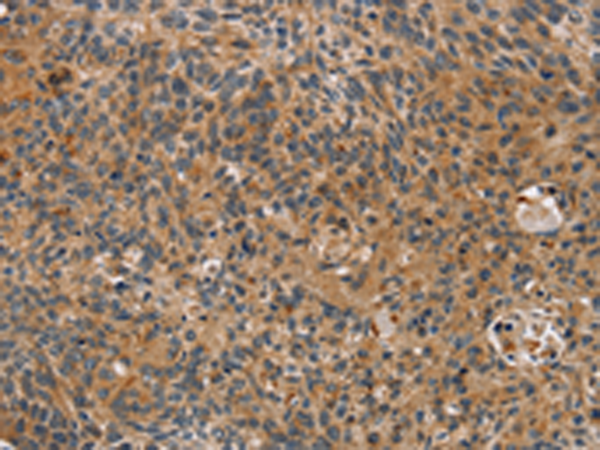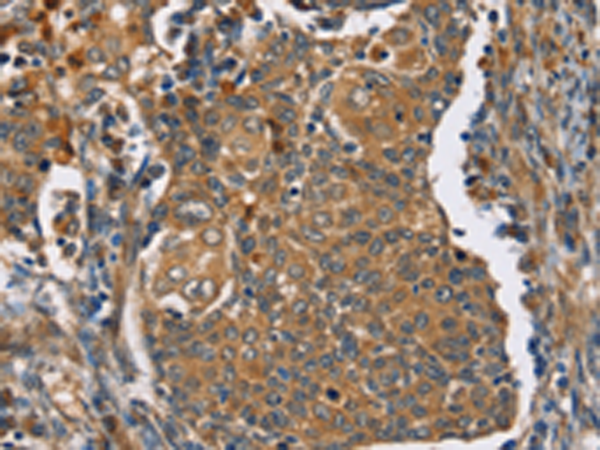

| WB | 1/500-1/1000 | Human,Mouse,Rat |
| IF | 咨询技术 | Human,Mouse,Rat |
| IHC | 1/50-1/100 | Human,Mouse,Rat |
| ICC | 技术咨询 | Human,Mouse,Rat |
| FCM | 咨询技术 | Human,Mouse,Rat |
| Elisa | 1/10000 | Human,Mouse,Rat |
| Aliases | NK2; NPK; NKNA; TAC2; Hs.2563 |
| Host/Isotype | Rabbit IgG |
| Antibody Type | Primary antibody |
| Storage | Store at 4°C short term. Aliquot and store at -20°C long term. Avoid freeze/thaw cycles. |
| Species Reactivity | Human, Mouse, Rat |
| Immunogen | Fusion protein of human TAC1 |
| Formulation | Purified antibody in PBS with 0.05% sodium azide and 50% glycerol. |
+ +
以下是关于 **Phospho-PKC epsilon (Ser729)** 抗体的3篇参考文献,包含文献名称、作者及简要摘要内容:
---
1. **文献名称**: *"Protein Kinase C Epsilon Phosphorylation at Ser729 Requires Co-localized Lipid Activators and Adapter Proteins"*
**作者**: Steinberg SF 等
**摘要**: 研究揭示了 PKCε 在 Ser729 位点的磷酸化机制,依赖脂质激活物(如二酰甘油)和支架蛋白的共定位,并讨论了该抗体在检测心肌细胞中 PKCε 激活状态的应用。
2. **文献名称**: *"Phosphorylation of PKCε at Ser729 in Hypoxia-Induced Retinopathy Promotes Endothelial Cell Proliferation"*
**作者**: Chen J 等
**摘要**: 发现缺氧条件下,PKCε 的 Ser729 磷酸化通过激活 ERK 信号通路促进视网膜内皮细胞增殖,该抗体被用于验证磷酸化水平与病理血管生成的关系。
3. **文献名称**: *"Role of PKCε-Ser729 Phosphorylation in Cardiac Ischemia-Reperfusion Injury"*
**作者**: Tanaka Y 等
**摘要**: 利用该抗体证实,心肌缺血再灌注损伤中 PKCε 的 Ser729 磷酸化水平升高,抑制此位点可减少氧化应激和细胞凋亡,提示其作为潜在治疗靶点。
---
以上文献均聚焦于 PKCε Ser729 磷酸化的功能机制及其在疾病模型中的作用,并明确使用了针对该位点的抗体进行实验验证。如需具体期刊信息或DOI,可进一步补充。
The Phospho-PKC epsilon (Ser729) antibody is a specialized tool used to detect the activated form of Protein Kinase C epsilon (PKCε), a member of the serine/threonine kinase family. PKCε plays critical roles in cellular signaling pathways regulating cell survival, proliferation, and stress responses. Its activation typically involves phosphorylation and translocation to cellular membranes. The Ser729 phosphorylation site, located within the catalytic domain, is associated with kinase activation and downstream signaling. This phosphorylation event is implicated in diverse physiological processes, including cardioprotection during ischemia, neuronal function, and immune regulation, as well as pathological conditions like cancer, diabetes, and neurodegenerative diseases.
The antibody specifically recognizes PKCε phosphorylated at Ser729. enabling researchers to study its activation status in various experimental models. It is widely used in techniques such as Western blotting, immunohistochemistry, and immunofluorescence to assess PKCε signaling dynamics in response to stimuli like growth factors, oxidative stress, or pharmacological agents. Studies utilizing this antibody have clarified PKCε's role in cardiac preconditioning, where its activation mitigates ischemic damage, and in cancer progression, where it promotes tumor cell survival and metastasis.
Validated for specificity in multiple species and sample types, this antibody serves as a key reagent for investigating PKCε's context-dependent functions and its potential as a therapeutic target. Its application continues to advance understanding of cell signaling mechanisms in health and disease.
×